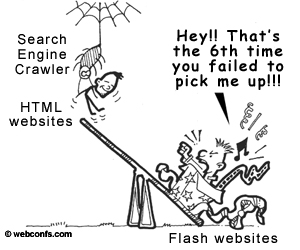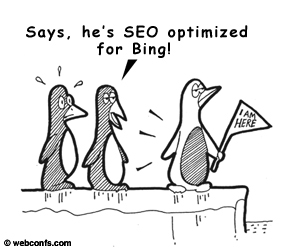I.
Introduction – What Is SEO


Whenever you enter a query in a search engine and hit 'enter' you get a list of web results
that contain that query term. Users normally tend to visit websites that are at the top of this list as
they perceive those to be more relevant to the query. If you have ever wondered why some of these
websites rank better than the others then you must know that it is because of a powerful web marketing
technique called Search Engine Optimization (SEO).
SEO is a technique which helps search engines find and rank your site higher than the millions of other sites in
response to a search query. SEO thus helps you get traffic from search engines.
This SEO tutorial covers all the necessary information you need to know about Search Engine Optimization
- what is it, how does it work and differences in the ranking criteria of major search engines.
1. How Search
Engines Work

The first basic truth you need to know to learn SEO is that search
engines are not humans. While this might be obvious for everybody,
the differences between how humans and search engines view web pages
aren't. Unlike humans, search engines are text-driven. Although
technology advances rapidly, search engines are far from intelligent
creatures that can feel the beauty of a cool design or enjoy the
sounds and movement in movies. Instead, search engines crawl the Web,
looking at particular site items (mainly text) to get an idea what a
site is about. This brief explanation is not the most precise because
as we will see next, search engines perform several activities in
order to deliver search results – crawling, indexing,
processing, calculating relevancy, and retrieving.
First, search engines crawl the Web to see what is there.
This task is performed by a piece of software, called a crawler
or a spider (or Googlebot, as is the case with Google).
Spiders follow links from one page to another and index everything
they find on their way. Having in mind the number of pages on the Web
(over 20 billion), it is impossible for a spider to visit a site
daily just to see if a new page has appeared or if an existing page
has been modified, sometimes crawlers may not end up visiting your site for a
month or two.
What you can do is to check what a crawler sees from your site. As
already mentioned, crawlers are not humans and they do not see
images, Flash movies, JavaScript, frames, password-protected pages
and directories, so if you have tons of these on your site, you'd
better run the Spider Simulator below to see if these goodies are viewable by the spider. If
they are not viewable, they will not be spidered, not indexed, not
processed, etc. - in a word they will be non-existent for search
engines.
After a page is crawled, the next step is to index its
content. The indexed page is stored in a giant database, from where
it can later be retrieved. Essentially, the process of indexing is
identifying the words and expressions that best describe the page and
assigning the page to particular keywords. For a human it will not be
possible to process such amounts of information but generally search
engines deal just fine with this task. Sometimes they might not get
the meaning of a page right but if you help them by optimizing it, it
will be easier for them to classify your pages correctly and for you
– to get higher rankings.
When a search request comes, the search engine processes it
– i.e. it compares the search string in the search request with
the indexed pages in the database. Since it is likely that more than
one page (practically it is millions of pages) contains the search
string, the search engine starts calculating the relevancy of
each of the pages in its index with the search string.
There are various algorithms to calculate relevancy. Each of these
algorithms has different relative weights for common factors like
keyword density, links, or metatags. That is why different search
engines give different search results pages for the same search
string. What is more, it is a known fact that all major search
engines, like Yahoo!, Google, Bing, etc. periodically change their
algorithms and if you want to keep at the top, you also need to adapt
your pages to the latest changes. This is one reason (the other is
your competitors) to devote permanent efforts to SEO, if you'd like
to be at the top.
The last step in search engines' activity is retrieving the
results. Basically, it is nothing more than simply displaying them in
the browser – i.e. the endless pages of search results that are
sorted from the most relevant to the least relevant sites.
2. Differences Between the Major Search Engines

Although the basic principle of operation of all search engines is
the same, the minor differences between them lead to major changes in
results relevancy. For different search engines different factors are
important. There were times, when SEO experts joked that the
algorithms of Bing are intentionally made just the opposite of
those of Google. While this might have a grain of truth, it is a
matter a fact that the major search engines like different stuff and
if you plan to conquer more than one of them, you need to optimize
carefully.
There are many examples of the differences between search engines.
For instance, for Yahoo! and Bing, on-page keyword factors are of
primary importance, while for Google links are very, very important.
Also, for Google sites are like wine – the older, the better,
while Yahoo! generally has no expressed preference towards sites and
domains with tradition (i.e. older ones). Thus you might need more
time till your site gets mature to be admitted to the top in Google,
than in Yahoo!.
|




